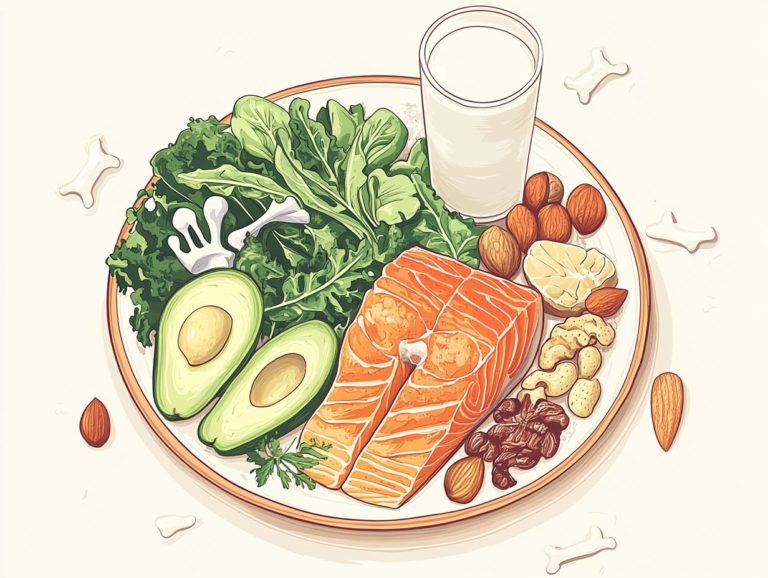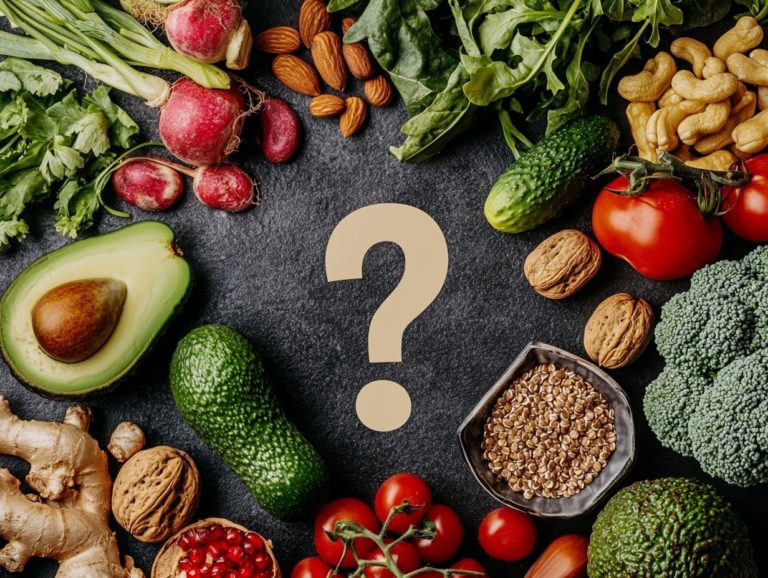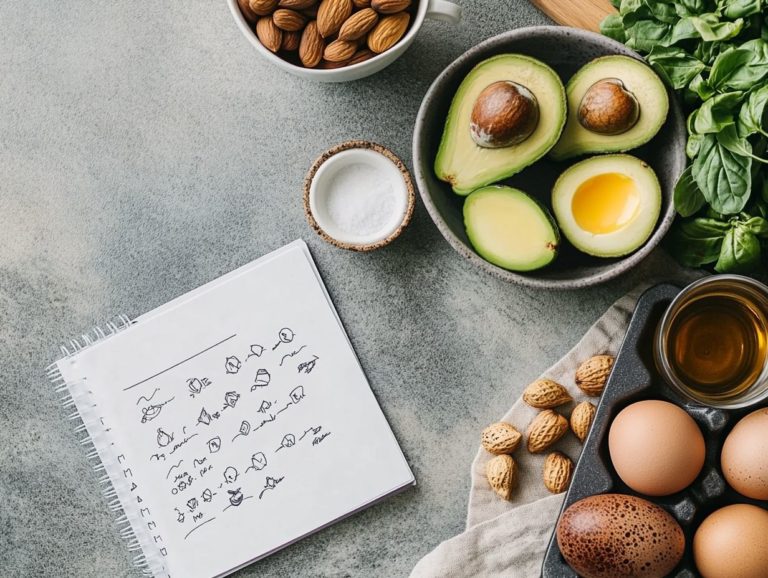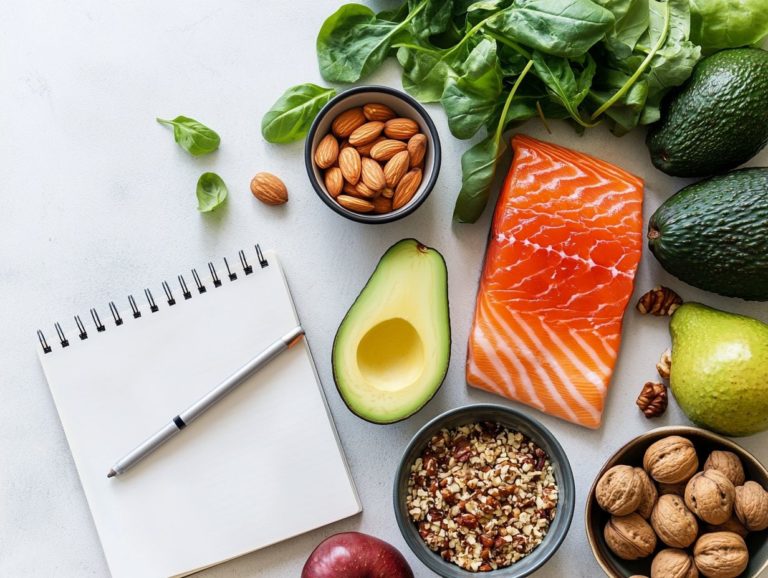How Many Carbs Can I Eat on Keto? FAQs Explained
Navigating the keto landscape can feel like traversing a maze, particularly when it comes to grasping carbohydrate intake. With a lot of different information out there, you may find yourself questioning just how many carbs you can truly enjoy while still reaping the rewards of this low-carb lifestyle. Consulting with a registered dietitian can provide valuable insights into this process.
This article meticulously outlines everything you need to know, from the recommended daily carb limits to identifying the best and worst sources of carbohydrates. You will also learn about the types of food you should prioritize to meet your dietary needs.
It delves into the benefits of curbing your carb consumption, the potential pitfalls of overindulgence, and offers practical strategies to help you stay the course. This includes tips for hydration and finding keto-friendly snack options.
Dive into this guide now to clarify your carbohydrate queries, explore keto-compliant meal plans, and elevate your keto experience!
Contents
- Key Takeaways:
- How Many Carbs Can I Eat on Keto?
- What Are the Benefits of Limiting Carbs on Keto?
- 1. Promotes Weight Loss
- 2. Improves Blood Sugar Control
- 3. Increases Energy and Mental Clarity
- Introduction
- 4. Reduces Risk of Chronic Diseases
- What Are the Risks of Consuming Too Many Carbs on Keto?
- 1. Kicks You Out of Ketosis
- 2. Causes Blood Sugar Spikes and Crashes
- Conclusion
- How Can I Track My Carb Intake on Keto?
- Tips to Stay Under Your Carb Limit on Keto
- 2. Stick to Low-Carb Foods
- 3. Avoid Temptations and Triggers
- 4. Listen to Your Body’s Hunger and Fullness Cues
- Frequently Asked Questions
Key Takeaways:

- It is recommended to limit daily carb intake on keto to 20-50 grams per day to promote weight loss, improve blood sugar control, increase energy and mental clarity, and reduce the risk of chronic diseases like diabetes and cardiovascular issues.
- Consuming too many carbs can lead to being kicked out of ketosis, blood sugar spikes and crashes, and weight gain.
- To track carb intake on keto, you should count either total carbs or net carbs, use a food tracking app, or keep a food journal.
How Many Carbs Can I Eat on Keto?
Understanding your carbohydrate intake on a keto diet is essential for reaching and maintaining ketosis, a state where your body burns fat for energy instead of carbs. This shift can also help manage conditions like polycystic ovary syndrome and hypoglycemia by stabilizing insulin and blood sugar levels.
The ketogenic diet, marked by its low-carb and high-fat principles, can greatly impact your weight loss journey and overall health when executed properly.
In this section, you will discover the recommended daily carb intake for keto. You will also learn how to calculate your individual carb limit and explore the types and sources of foods that align with this dietary strategy.
What is the Recommended Daily Carb Intake on Keto?
Your recommended daily carb intake on the keto diet typically ranges between 20 to 50 grams of net carbs, tailored to your specific dietary needs and health objectives. This low carb intake is essential for entering and maintaining ketosis, a state in which your body efficiently burns fat for fuel instead of carbohydrates.
This range can fluctuate significantly based on various factors, such as your age, gender, and activity level. If you re younger or lead a more active lifestyle, you might find that a slightly higher carb allowance serves your energy needs better. Conversely, older adults or those with certain health conditions like type 2 diabetes may experience greater benefits by sticking closer to the lower end of the spectrum.
By adhering to these carb recommendations, you not only support your weight management goals but also enhance your overall health by minimizing the risk of nutritional deficiencies. Focusing on high-quality carbohydrate sources like low-carb fruits and leafy vegetables allows you to align your dietary choices with your unique requirements, ensuring you receive the necessary vitamins and minerals that are vital for your optimal well-being.
For personalized advice, consider consulting a healthcare provider or dietitian.
How Do I Calculate My Personal Carb Limit on Keto?
Calculating your personal carbohydrate limit on the keto diet requires careful consideration of your daily calorie needs, activity level, and specific weight loss goals. These factors can vary greatly from person to person. A wise approach is to consult with a registered dietitian. They can help craft personalized meal plans that align with your dietary preferences and provide comprehensive nutrition information.
To pinpoint the right carbohydrate intake, begin by evaluating key factors such as your body weight, height, age, and overall health. Understanding your energy levels throughout the day can provide valuable insights into how carbohydrates impact your performance and well-being. Pay attention to how your body responds to different amounts of carbs. Adjust your intake based on your physical activity and how satisfied you feel.
Keeping a food journal is a helpful tool for identifying your optimal carb range over time. As your weight loss or fitness goals evolve, re-evaluating your carbohydrate limits may become necessary. This ensures that you maintain an effective and enjoyable nutritional plan.
What Are the Best Sources of Carbs on Keto?
On a keto diet, your best sources of carbs are primarily low-carb fruits, non-starchy vegetables, and select nuts and seeds. These choices keep your carb intake low while delivering essential nutrients that support your ketogenic journey and promote weight loss. Foods like lean protein and olive oil are also beneficial when included in your meal plans.
Take avocados, for example. They are the quintessential low-carb fruit, bursting with healthy fats and fiber. This aids digestion and boosts your feeling of fullness. Leafy greens like spinach and kale are excellent choices; they offer minimal carbs while being chock-full of vitamins A, C, and K. This makes them perfect for salads or smoothies.
Incorporating zucchini and cauliflower into your meals adds volume and enhances nutrient content without significantly raising your carb count. And don t forget about berries! Enjoy raspberries and strawberries in moderation. They provide a delightful mix of antioxidants and fiber that fit seamlessly into your balanced meal plan.
By prioritizing these options, you can maintain nutritional value while effortlessly sticking to the low-carb principles of the keto lifestyle.
Avoid These High-Carb Foods on Keto!
When you’re on a keto diet, it’s essential to steer clear of high-carb foods like grains, sugary snacks, and certain fruits. These can seriously sabotage your journey to achieving and maintaining ketosis. Not only do these foods pose health risks, but they can also lead to potential nutritional deficiencies, impact your blood sugar levels, and cause side effects like keto flu.
Processed foods and beverages packed with hidden sugars can further derail your progress. These cause those pesky insulin spikes that no one wants. Let’s not forget about alcohol; many drinks are surprisingly high in carbs and can throw a wrench in your fat-burning efforts.
For anyone devoted to a ketogenic lifestyle, it s crucial to recognize that even moderate alcohol consumption can disrupt ketosis and hinder your overall weight loss results.
By being mindful of these dietary pitfalls, you can enable yourself to make healthier choices and stay aligned with your ketogenic goals.
What Are the Benefits of Limiting Carbs on Keto?
Limiting carbohydrate intake on the keto diet presents you with a wealth of health benefits. These benefits can significantly enhance your overall wellness and support your weight loss objectives. Experts like Scott Keatley and Kendra Whitmire suggest that this approach can help manage chronic diseases and improve mental clarity.
This strategy encourages fat-burning through ketosis. It also improves your blood sugar control, elevates your energy levels, and reduces the risk of chronic diseases.
You ll discover it’s an exciting way to transform your health!
If you’re ready to start your keto journey or need personalized advice, reach out to a qualified professional today.
1. Promotes Weight Loss

The keto diet offers a compelling approach to weight loss by inducing a metabolic state known as ketosis, where your body burns fat for energy instead of carbs. This powerful metabolic shift can help you lose weight effectively over time for many individuals.
During ketosis, your liver converts fats into ketones, which serve as an alternative fuel source. This process boosts your energy levels and helps regulate your appetite. By lowering insulin levels and stabilizing blood sugar, the keto diet can help curb cravings and reduce your overall calorie intake.
As your body becomes more adept at burning fat, you may find you don t need to eat as frequently, leading to longer periods of satiety. However, it’s important to monitor your fiber intake to ensure digestive health.
This unique mechanism of fat oxidation highlights the potential for effectively managing weight while promoting sustained energy throughout your day.
2. Improves Blood Sugar Control
One of the significant advantages of the keto diet is its remarkable ability to enhance blood sugar control, especially for those when your body doesn t respond well to insulin or those with type 2 diabetes. By dramatically cutting back on carbohydrate intake and favoring foods that do not cause a quick spike in blood sugar, the diet stabilizes insulin levels and helps maintain optimal blood sugar levels.
Research suggests that embracing a ketogenic lifestyle can lead to heightened insulin sensitivity, a key factor for optimal metabolic health. Numerous studies, including those published in the Journal of Clinical Endocrinology and Nutrition Metabolism, show that participants often experience lower fasting blood sugar levels and reduced HbA1c percentages. This indicates improved long-term glucose management.
Nutrition experts often advocate for the keto diet because it provides sustained energy without the spikes and crashes that come with high-carb diets. This stabilization of blood sugar promotes better daily functioning and helps prevent complications associated with diabetes, such as neuropathy and cardiovascular issues.
The diet’s focus on foods that do not cause a quick spike in blood sugar also supports blood sugar control. Therefore, the keto diet presents a compelling option for enhancing your overall health while effectively managing your condition.
3. Increases Energy and Mental Clarity
Utilizing fat as your primary energy source in ketosis, the ketogenic diet can lead to increased energy levels and enhanced mental clarity. This steady supply of energy enables you to maintain improved focus and productivity throughout the day.
Those who embrace this low-carb lifestyle often experience a significant transformation in their approach to daily activities, both physically and mentally. As your body transitions into this fat-burning mode, it taps into a more sustainable energy source and minimizes the dreaded energy crashes that often accompany sugar-dependent diets.
You may find that tedious tasks become easier and your moments of concentration extend, translating into heightened performance at work or in your personal pursuits. This newfound efficiency fosters a sense of accomplishment that significantly enhances your overall well-being.
The mental sharpness frequently reported by individuals on the keto diet can empower you with better decision-making and creative problem-solving abilities essential skills in both professional and social settings.
Introduction
4. Reduces Risk of Chronic Diseases
Adopting a ketogenic diet has been associated with a reduced risk of chronic diseases, such as heart disease, type 2 diabetes, and certain types of cancer. By encouraging weight loss and enhancing metabolic health, this dietary approach can effectively address factors contributing to these conditions.
Research studies suggest that the ketogenic approach may help lower blood glucose levels and improve insulin sensitivity. This plays a crucial role in managing chronic illnesses. However, it is important to acknowledge the potential for a lack of important nutrients often linked to this lifestyle.
If you’re following the keto diet, ensure you’re obtaining sufficient vitamins and minerals. This is particularly important for nutrients scarce in high-fat, low-carb foods, like fiber, magnesium, and potassium.
To promote optimal health while maximizing the long-term benefits of this dietary strategy, consider integrating a diverse range of nutrient-dense foods. Explore supplements as needed under guidance from a registered dietitian or medical professional.
What Are the Risks of Consuming Too Many Carbs on Keto?
Consuming an excess of carbohydrates while following the keto diet can yield unfavorable consequences. This primarily disrupts your state of ketosis a crucial element for harnessing the full benefits of this low-carb dietary approach.
Such a misstep can trigger unwanted blood sugar spikes and promote weight gain. It can also introduce various health risks, including hypoglycemia, that can compromise the effectiveness of your ketogenic journey.
1. Kicks You Out of Ketosis
One of the primary risks you face when consuming too many carbs on the keto diet is the chance of kicking yourself out of ketosis. This effectively wipes out the metabolic advantages of this low-carb approach.
When your carb intake exceeds the prescribed limits, your body shifts back to using glucose as its primary energy source. This shift increases your risk of health issues, such as insulin resistance, which means your body doesn t respond well to insulin, making it harder to manage blood sugar levels.
This change can drastically alter your energy levels and impact your mental clarity. Your brain thrives on ketones while in ketosis. Increased carbohydrate consumption can trigger more insulin production, halting fat burning and leading to unwanted weight gain.
You must carefully track your carb intake to stay in ketosis and enjoy the numerous benefits of the keto diet! Understanding how excess carbs impede your body s ability to produce ketones is crucial for anyone aiming to reap the myriad health benefits associated with this dietary regimen.
2. Causes Blood Sugar Spikes and Crashes
High carbohydrate consumption can lead to blood sugar spikes and crashes. This creates fluctuations that may impact your overall health and energy levels.
When you begin to reintroduce carbs into your diet, it s essential to do so with care. This is to prevent adverse effects and maintain stable insulin levels.
The physiological mechanisms behind this involve the rapid digestion and absorption of carbohydrates. This results in a swift increase in glucose levels in your bloodstream. This surge prompts your pancreas to release insulin, the hormone responsible for transporting glucose into your cells.
However, excessive insulin production can lead to a sharp drop in blood sugar. Many people experience this as energy crashes, irritability, and cravings.
Over time, these recurring spikes and crashes can contribute to insulin resistance, a precursor to type 2 diabetes. They may also heighten the risk of cardiovascular issues, obesity, and metabolic syndrome.
Understanding these processes is vital for maintaining stable energy levels and overall health, particularly when adjusting your dietary practices.
Conclusion
Maintaining proper carbohydrate intake while on a ketogenic diet is crucial for your health. By understanding the impact of excess carbs, you can effectively manage your diet and enjoy the numerous benefits of the keto lifestyle.
3. Leads to Weight Gain
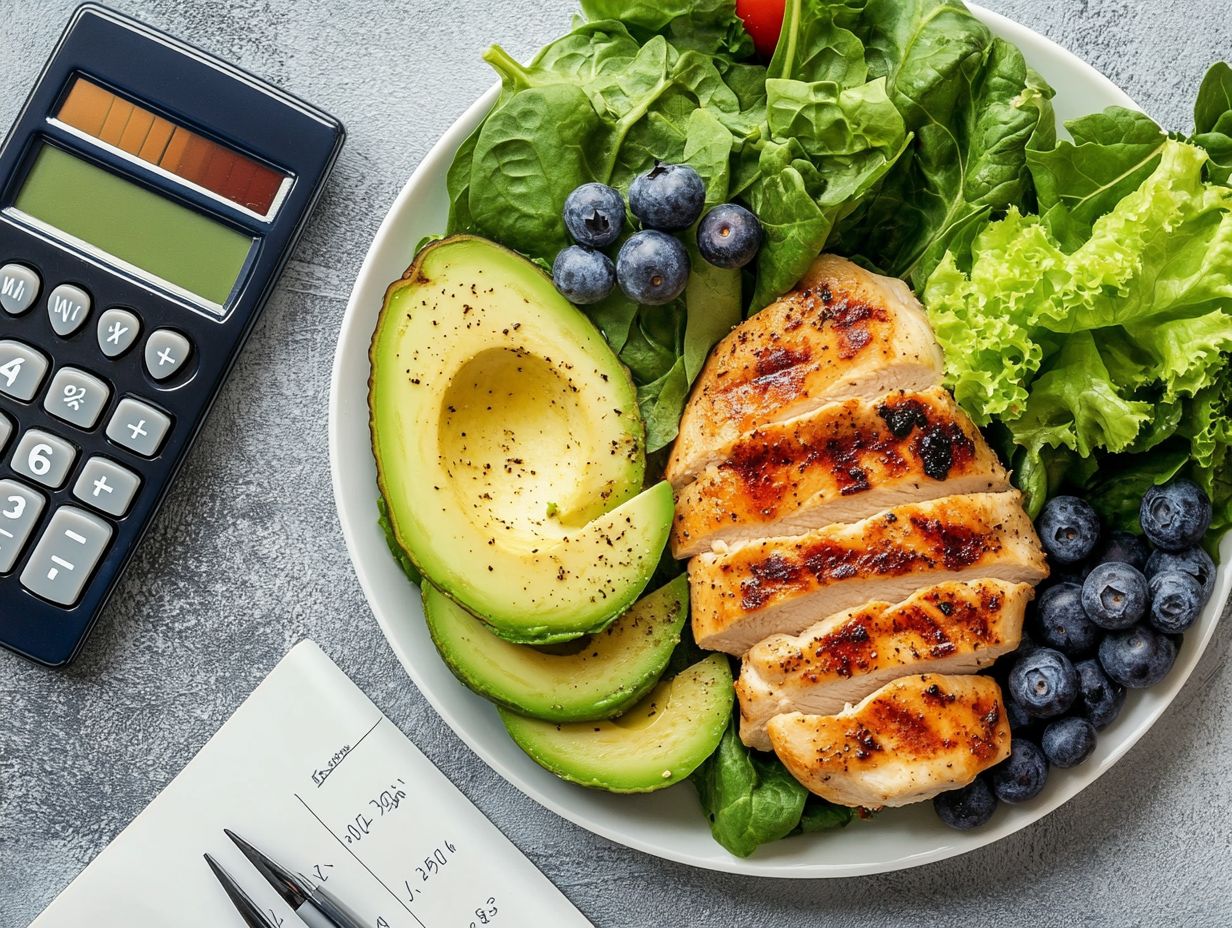
Exceeding your carb limits on the keto diet can lead to weight gain, which is certainly not what you’re aiming for if you want to shed some pounds or maintain your current body weight. When you consume too many carbs, your body tends to revert to glucose metabolism, promoting fat storage rather than fat-burning.
As your carbohydrate intake increases, your insulin levels rise (a hormone that helps regulate blood sugar levels), sending a message to your body to store energy as fat instead of tapping into those fat reserves for fuel. This shift not only makes it harder for you to access your body s fat stores but also leads to heightened hunger and cravings, complicating your weight loss efforts.
On the flip side, keeping your carb intake low encourages your body to enter ketosis, where it becomes far more adept at burning fat for energy. For anyone serious about their weight management journey, understanding how to balance your macronutrients particularly carbs is crucial.
Ignore this balance, and you might find yourself frustrated and straying from the impressive benefits that the keto diet has to offer.
How Can I Track My Carb Intake on Keto?
Tracking your carb intake on the keto diet is crucial for staying within your daily limits and reaching your weight loss goals. You have several effective methods at your disposal to monitor your carb consumption, such as using food tracking apps or practicing carb counting.
Consider using food tracking apps, keeping a detailed food journal, or practicing carb counting to make sure you remain within the desired range. Each approach offers a unique way to stay accountable and on track.
Ultimately, these methods enable you to achieve the results you desire and maintain your healthy choices.
1. Counting Total Carbs vs. Net Carbs
One of the essential elements of tracking carb intake on a keto diet is grasping the distinction between total carbs and net carbs, as this understanding can profoundly influence your dietary management and health outcomes. Total carbs encompass all carbohydrates present in a food item, while net carbs take into account fiber and sugars that the body does not fully absorb. This is particularly important for those managing conditions like polycystic ovary syndrome or diabetes.
This distinction is particularly crucial for anyone committed to a low-carbohydrate lifestyle, as it directly affects how effectively you can maintain ketosis. By concentrating on net carbs, you can indulge in a broader array of foods, including those rich in fiber, without jeopardizing your ketogenic aspirations.
This approach to carb counting gives you more flexibility in meal planning, ultimately enhancing your overall adherence to the diet.
Grasping these concepts enables you to make informed choices about your food selections, ensuring that you remain within your daily carbohydrate limits while still savoring delicious and satisfying meals.
2. Using a Food Tracking App
Using a food tracking app can be a game changer for you as you navigate the keto diet, helping you keep a close eye on your carb intake and nutritional data. This makes it incredibly easy to crush your dietary goals and stay on track!
These apps offer valuable insights into food sources, meal delivery options, and allow you to visualize your daily carb consumption. These apps also provide information on nutrition content and dietary fats, helping you make informed decisions that align with your dietary guidelines.
Many of these platforms come equipped with handy features like barcode scanning, so logging your meals becomes a breeze no more tedious manual entries. You can also take advantage of customizable meal plans tailored to your tastes, sparking culinary creativity while ensuring you remain in ketosis.
Plus, various apps offer community support and educational resources to keep you motivated on your journey. These resources can include nutrition information and tips on incorporating healthy fats like olive oil and protein intake strategies.
By choosing the right food tracking app that aligns with your personal preferences and dietary needs, you can elevate your keto experience and effectively reach your health objectives, ensuring a balanced intake of high-fat and low-carb foods.
3. Keeping a Food Journal
A food journal is a powerful tool for tracking your carb intake on the keto diet. It allows you to log your meals and snacks while reflecting on your dietary choices.
This practice helps you identify patterns and preferences, and highlights areas where you can improve your eating habits, such as increasing your fiber intake or choosing better snack options.
Beyond enhancing your self-awareness, a food journal instills a sense of accountability by providing a clear record of what you consume each day. This level of transparency can be a powerful motivator, encouraging you to remain committed to your goals as you become more conscious of your food choices and their impact on your metabolic state.
Regularly reviewing your entries makes it easier to spot any slip-ups or deviations from a keto diet. Whether you choose a sleek app or a classic notebook, be sure to include details like portion sizes and meal times for effective journaling. Consulting with a medical professional or registered dietitian can also enhance this strategy.
Reflecting on how certain foods affect your feelings can promote mindful eating, leading to healthier and more beneficial dietary decisions.
Tips to Stay Under Your Carb Limit on Keto
Maintaining your carb limit on the keto diet can indeed be a challenge, yet with the right strategies and mindset, it becomes fully attainable. The keto diet can turbocharge your weight loss journey and offer numerous health benefits.
Here are some tips to help you stay on track:
- Plan your meals and snacks in advance.
- Focus on low-carb foods and steer clear of temptations.
- Ensure adequate fiber intake.
- Stay hydrated.
By taking these steps, you can successfully meet your dietary goals while enjoying a diverse array of keto-friendly options.
1. Plan Meals and Snacks Ahead of Time
Planning your meals and snacks ahead of time is an essential strategy for anyone following the keto diet. It ensures that you have low-carb options at your fingertips and reduces the temptation to stray from your dietary goals.
Embracing this proactive approach enhances your ability to make consistent, healthy choices and manage your protein intake effectively. Setting aside time each week to create a structured meal plan can significantly streamline your grocery shopping and cooking routines.
This not only alleviates stress but also minimizes last-minute decisions that could derail your commitment to keto. Utilizing meal delivery services that cater to the keto diet can also be a convenient option.
Incorporating a variety of proteins, healthy fats, and low-carb vegetables into your plans adds excitement to your meals while remaining firmly within the dietary framework necessary for achieving ketosis. This helps to balance your nutritional needs and can prevent nutritional deficiencies.
Keeping nutritious snacks like cheese sticks, nuts, or even homemade keto-friendly bars on hand can effectively curb the urge to indulge in high-carb temptations, further bolstering your dietary success. Make sure to include keto-compliant options that are low in carbs but also high in healthy fats and nutrients.
By taking these steps, you aren’t just preparing meals; you re thoughtfully crafting an environment that supports your long-term success on your keto journey. Consulting with a medical professional can ensure that your dietary approach is safe and effective for your individual needs.
2. Stick to Low-Carb Foods

Sticking to low-carb foods is crucial for maintaining your carb limits on the keto diet. These foods help you achieve your weight loss goals and enhance your overall health. By choosing nutrient-dense options that align with your dietary needs, you can significantly elevate your keto experience.
Be mindful of your carb intake and insulin levels to maximize the health benefits of the diet. To truly reap the benefits of this lifestyle, focus on a variety of low-carb sources. Think leafy greens, cruciferous vegetables, lean proteins like chicken and fish, and healthy fats found in avocados and nuts.
These foods are brimming with essential vitamins, minerals, and healthy fats, helping you keep your energy levels stable while promoting a satisfying feeling of fullness. Including low-carb fruits can also enhance the variety in your diet.
By incorporating a diverse range of food types, you can meet your nutritional needs and stave off the dreaded diet burnout. Paying attention to nutrition information on food labels can aid in making informed choices.
Exploring different culinary styles will turn healthy eating into an exciting adventure that keeps you motivated! Trying various types of food that are keto-friendly keeps meals exciting and provides a broader spectrum of nutrients.
3. Avoid Temptations and Triggers
Avoiding temptations and triggers that can lead to cravings for high-carb foods is essential for staying on track with your keto diet. By pinpointing specific situations or foods that disrupt your progress, you can devise effective strategies to navigate these challenges and uphold your weight loss goals.
Consulting with a registered dietitian like Scott Keatley or Kendra Whitmire can offer personalized advice. One highly effective tactic is to modify your environment. Remove high-carb snacks from your home and replace them with keto-friendly options like nuts, cheese, or low-carb vegetables.
Surrounding yourself with supportive friends or family members who respect your dietary choices can further bolster your commitment to your goals. Be mindful of your alcohol consumption as it can also affect your keto progress.
When cravings strike, having a plan in place is key. Consider practicing mindful eating or engaging in physical activities to distract yourself from those urges. Staying committed may involve planning your meals in advance or tracking your food intake. These methods keep your goals front and center, making it easier to resist tempting moments.
Research studies from institutions like the University of Massachusetts and the State University of New York have shown that these practices are effective.
4. Listen to Your Body’s Hunger and Fullness Cues
Listening to your body’s hunger and fullness cues can transform your approach to eating, enabling you to remain within your carb limits on the keto diet. By developing an awareness of these signals, you can effectively prevent overeating and support your weight loss goals with greater success.
This self-awareness can also help manage insulin levels effectively. When you tune into these physiological signals, you cultivate a healthier relationship with food, turning mealtime into an intentional experience instead of a rushed chore.
Mindfulness allows you to savor each bite, enhancing both enjoyment and satisfaction. This often leads to reduced cravings and fewer impulsive snack choices. Mindful eating can help manage common keto side effects like the keto flu.
As life becomes increasingly busy, incorporating practices like meal planning and mindful eating routines enables you to stay committed to your dietary goals. This approach fosters better adherence to your eating plans and promotes overall well-being.
Mindfulness in eating is about much more than just what you consume it’s about how you engage with food. Consulting experts from the Mayo Clinic or the American Diabetes Association can provide additional insights into this practice.
Frequently Asked Questions
How many carbs can I eat on keto?
The recommended carb intake on a keto diet is typically less than 50 grams of net carbs per day. This helps maintain a metabolic state known as ketosis, which is essential for burning fat.
What are net carbs?
Net carbs are calculated by subtracting the grams of fiber from the total carbohydrates in a food. Fiber is not digested by the body, so it does not affect blood sugar levels. This method helps you stay within your dietary guidelines.
Can I still eat fruits and vegetables on keto?
Yes, you can enjoy fruits and vegetables on a keto diet. However, choose low-carb options like berries, avocados, leafy greens, and cruciferous vegetables. These foods provide vital nutrients and help maintain stable blood sugar levels.
Do I need to count total carbs or net carbs?
It is best to count net carbs on a keto diet. Net carbs have a lower impact on blood sugar levels and aid in staying in ketosis. Research supports this practice, as highlighted in the Journal of Clinical Endocrinology and Nutrition Metabolism.
What happens if I eat too many carbs on keto?
Eating too many carbs can lead your body to revert to using carbs for fuel instead of fat. This may kick you out of ketosis and trigger carb cravings and other side effects. It can also disrupt your insulin levels and overall energy balance.
Can I have cheat days on keto?
Some individuals opt for cheat days on keto, but this can hinder your progress. It may be harder to return to ketosis afterward. Sticking to the recommended carb limit ensures consistent success in maintaining a ketogenic state.
Staying informed about your carb intake is key to achieving your health goals on the keto diet!



